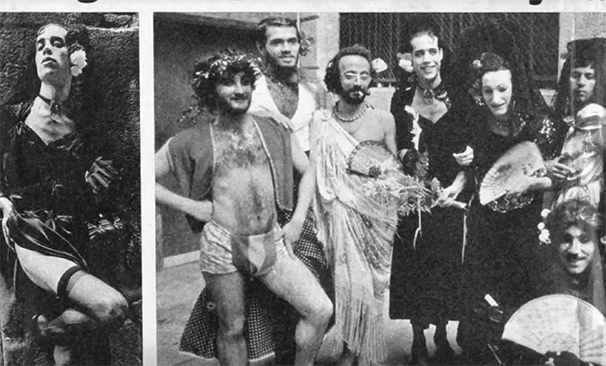What are you looking for?
You might be looking for...
Quan diem que Camilo va morir de SIDA el que estem dient...
When we say that Camilo died of AIDS, what we are saying is...
General and specialised audiences: contemporary art and thought, experimental video, archives, culture & technology
Activity open to everyone and free of charge, limited to 55 people

Screening of Camilo... la vida como performance by Isaias Griñolo and Antonio Orihuela, and discussion with José Begega and Irene A. Picallo aka Ilya Darling.
"Camilo was perhaps invisible. Not because of his beauty or overflowing energy or his radical way of existing, but because he did not develop his qualities productively. He was perhaps a muse, he murmured in the ear of his friends Ocaña and Nazario his mischief, he was the energy that invited to create, that quality attributed to the feminine and therefore that fear of doing something by himself, of finishing it. To develop all that potential and fail. However, Camilo was perhaps very visible expressing her pen from bed to bed, from street to street, looking for bearded men and making her way of inhabiting the world a radical act against the system, impeccably dressed. And this is a lot."
Camilo... la vida como performance is a film essay by Isaías Griñolo Padilla and Antonio Orihuela around the figure of Camilo, his staging of life, in which he faced dissidence from his historical moment, the consequences of contracting AIDS and how his experience is reflected in that of many other people. For its authors, this work is a contribution to how much still needs to be sewn together in living together in diversity.
The screening of this video will be accompanied by a presentation and talk by José Begega and Irene A. Picallo aka Ilya Darling, both HIV-positive and with different links to Stop AIDS. Together they have developed the text excerpts quoted on this page.
"What was and is HIV? There are times when I like to say that HIV doesn't exist, at the risk of sounding like a denialist and making friends and enemies throw their hands up in the air. But it is true. There is a retrovirus that uses its RNA in the cells of the immune system to reproduce itself; however, when we say HIV or talk about AIDS we are talking about a genocide that happened in the 80's and 90's, we are talking about homophobia. The entire transmarikabollo community was left to die by a society that looked the other way and did not want to take charge of a pandemic that, pragmatically, had sex and drugs as its main means of transmission. Today, treatment is still a luxury that can only be afforded by wealthy societies".
"Internalised homophobia is created by growing up in a context that rejects your identity, in families that are ashamed, that look at you as a disappointment, teachers and classmates who humiliate and insult you, maturing without referents, rights or representation and in fear of AIDS. This generates certain types of identities: sometimes it turns into rage to change things, tenacity to show with your work that you are worthwhile and that you have a meaning; other times fear remains inside, you have internalised that perhaps it is true what they have told you so much and that despite all the talent and work you will never achieve anything, in general, because you have accepted that perhaps they were right. That you are invisible.
José Begega is a porn actor, sex worker and visual artist with a gaze interested in pleasure, mourning, shame, trauma, pathologisation and the stigma of what he understands as "secondary characters". He performs a dubious and mutable identity that makes his work question the notion of "reality". In each project we can see how he illuminates a new part of his biography by caressing the stigma.
Irene A. Picallo aka Ilya Darling is a filmmaker (fiction and documentary), graphic designer and HIV activist. Her artistic work focuses on social realism and her interest in issues such as death, as well as the need to break stigmas with her work, whether related to mental health or HIV and sexual health.
Stop is a community-based organisation that was created by LGBT+ volunteers in 1986 in response to the HIV/AIDS pandemic and in solidarity with people living with HIV. It promotes sexual health with a rights-based approach for the LGTBIQ+ and GTBI+ community in sex work through counselling, risk reduction and pleasure management. It offers a range of services in response to the needs expressed by the community, with the support of a team of sexual health technicians.
By:
